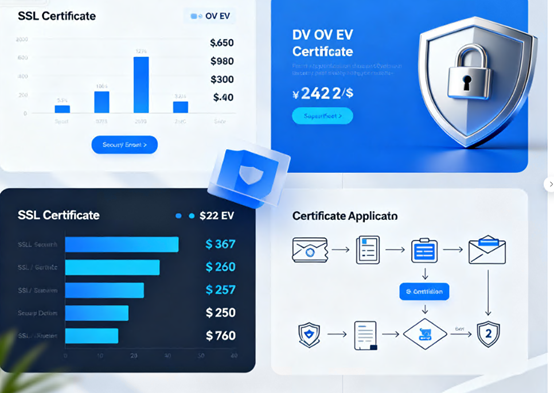What are the charging standards for website SSL certificates?
The pricing matrix for SSL certificates is primarily composed of five dimensions: verification level, brand positioning, features, security services, and purchasing channels. These intertwined factors collectively determine the final price of a certificate, reflecting a delicate balance between security needs and cost.
SSL certificates are fundamental to website security. Behind the lock icon displayed in the browser address bar when users browse websites is the SSL certificate silently safeguarding the security of data transmission. SSL certificate prices vary significantly in the market, ranging from completely free to tens of thousands of yuan. Understanding the pricing structure can help businesses make more informed security investment decisions.
The verification level is a key factor influencing the price of an SSL certificate. SSL certificates are categorized by the depth of verification: Domain Validation (DV), Organization Validation (OV), and Extended Validation (EV). DV certificates only verify domain ownership and provide basic encryption, making them suitable for personal websites and test environments. Annual fees range from 100 to 500 yuan. OV certificates verify the authenticity and legitimacy of the company and display organizational information in the certificate, enhancing user trust. They are suitable for corporate websites and e-commerce platforms, with prices ranging from 700 to 3,000 yuan per year. EV certificates adhere to the strictest international standards and require a comprehensive verification of a company's legal identity, physical address, and other aspects. The company name will appear in green in the browser address bar, significantly enhancing user trust. They are primarily used in highly sensitive sectors such as finance and e-commerce, with annual fees ranging from approximately 2,000 to 10,000 yuan.
Brand positioning directly impacts the market price of a certificate. The reputation and technical expertise of different certificate authorities (CAs) creates significant price stratification. Internationally renowned brands, with their wide browser compatibility and years of technological expertise, command relatively high prices.
Functionality is another key determinant of certificate price. The number and type of domains protected by a certificate directly influence its pricing structure. Single-domain certificates protect only one domain and are the most economical. Wildcard certificates protect a domain and all its subdomains. While costing 3-5 times more than single-domain certificates, they offer lower management costs and lower total cost of ownership compared to purchasing individual certificates for each subdomain. Multi-domain certificates support multiple, completely different domains. Typically, a base package includes 3-5 domains, with additional domains requiring a fee. They are suitable for businesses with multiple brands.
Guarantee services and added value are also important. Paid SSL certificates typically offer varying levels of security insurance, ranging from $100,000 to $1.75 million. This provides crucial risk protection that free certificates don't offer. Furthermore, services like professional technical support, certificate installation guidance, and vulnerability scanning can add to the overall cost of a certificate. Some high-end certificates also offer compliance certification support, helping businesses meet international security standards like GDPR and PCI DSS.

The purchasing channel significantly impacts the final price. Official direct sales channels offer comprehensive technical support, but are generally more expensive. Authorized resellers and major cloud service platforms often enjoy discounts for bulk purchases, offering users more competitive pricing. It's worth noting that the certificate validity period is also related to the annual cost. Some service providers offer multi-year plans, such as a three-year plan, which costs approximately 2.5 times the annual price, making it more economical in the long run.
For individual users with limited budgets or for testing purposes, the free DV certificates offered by some organizations are a viable starting point. These certificates provide basic encryption capabilities, but are valid for only 90 days, require frequent renewal, and lack support for advanced features like wildcards (an earlier restriction has been lifted). A free certificate is like a bicycle, meeting basic transportation needs; a paid certificate is like a car, providing more comprehensive and comfortable security.
When choosing an SSL certificate, the most expensive isn't necessarily the best. The one that best suits your business needs is the optimal solution. Personal blogs and small websites can start with a free DV certificate or a low-cost domestic DV certificate. Small and medium-sized enterprise websites are suitable for OV certificates, which control costs while demonstrating legitimacy. E-commerce platforms and financial institutions should prioritize EV certificates to build a comprehensive trustworthy environment. By scientifically assessing business needs and rationally weighing various factors, businesses of all sizes can find the optimal balance between security and cost, laying a solid security foundation for digital transformation.

 DNS Intelligent Resolution
DNS Intelligent Resolution

 Custom Authoritative DNS
Custom Authoritative DNS
 Cloud Computing Services
Cloud Computing Services
 Server Rental
Server Rental
 DDoS protection
DDoS protection
 About DNS.COM
About DNS.COM
 Support
Support
 Contact Us
Contact Us
 AFF
AFF
 API Docs
API Docs

 CN
CN
 EN
EN





 Online Customer service
Online Customer service






